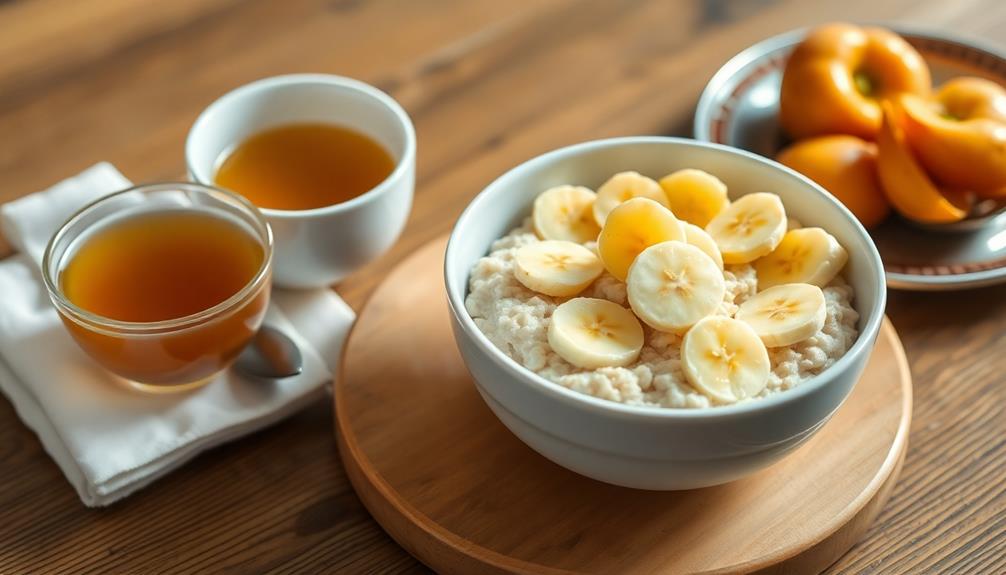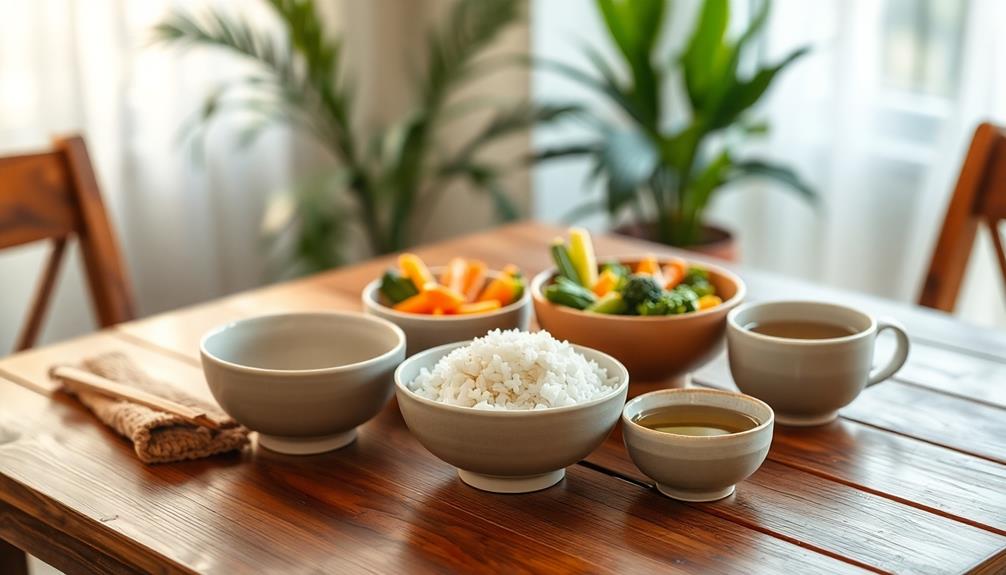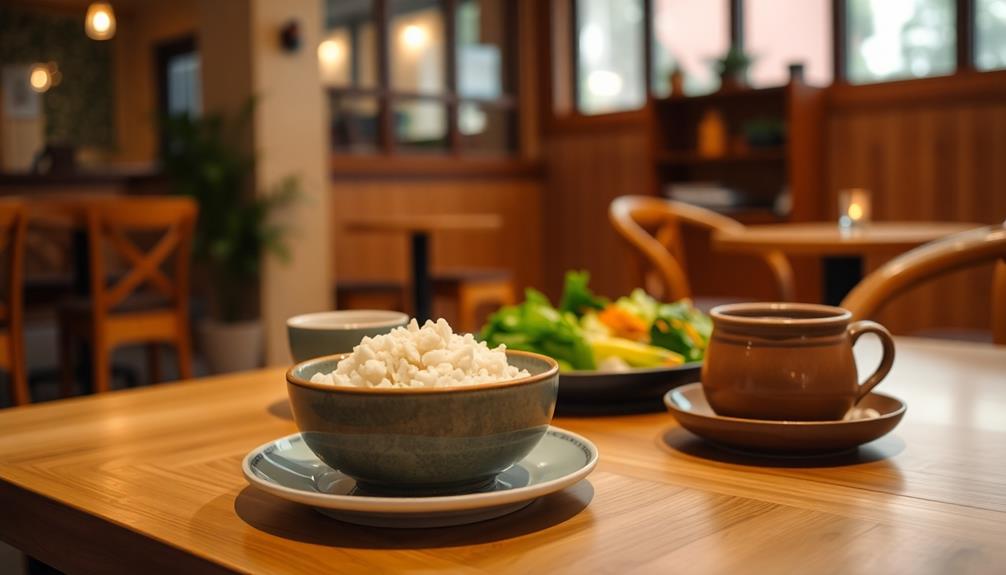When you're dealing with an upset stomach, reach for bland foods like plain rice, toast, or boiled potatoes. Broth-based soups, whether chicken or vegetable, are soothing and hydrating. Choose lean proteins like grilled chicken or whitefish to keep your meal gentle on the digestive system. Steamed vegetables, such as carrots and spinach, are much kinder than raw options. Avoid spicy, fried, or creamy dishes that can worsen your symptoms. With these choices, you'll start to feel more comfortable soon. If you're curious about specific dishes and preparation tips, there's plenty more to explore!
Key Takeaways
- Choose broth-based soups, like chicken or vegetable, for hydration and gentle nourishment that soothes an upset stomach.
- Opt for plain rice or boiled potatoes to help absorb excess stomach acid and ease digestion.
- Select steamed vegetables, such as carrots or spinach, which are easier to digest than raw options.
- Order bland proteins like grilled or baked chicken or fish without heavy sauces for a gentle meal.
- Toast or plain bread fits well into the BRAT diet, aiding in settling the stomach effectively.
Recommended Foods for Relief

When you're dealing with an upset stomach, choosing the right foods can make all the difference. Start by opting for bland foods like plain rice or white toast, which are part of the BRAT diet. These options are easy to digest and can really help settle your stomach.
Including a budget plan for your meals can also help you make healthier choices. Broth-based soups, such as chicken or vegetable broth, are another great choice. They provide hydration and essential nutrients without being too harsh on your stomach.
Lean proteins are also important. Look for unseasoned, grilled chicken or whitefish dishes, as they're low in fat and much easier to digest than fried or fatty foods.
For dessert, consider a gelatin dessert or plain pudding; these options are gentle on your stomach while helping with hydration.
If you want some veggies, go for steamed vegetables like carrots or spinach. Steaming makes them easier to digest compared to raw salads.
Foods to Avoid

An upset stomach can make dining out challenging, and knowing what to avoid is essential for comfort. Steering clear of certain foods can help ease your digestive system and minimize stomach discomfort. Here are the main culprits to watch out for:
| Food Category | Reason for Avoidance |
|---|---|
| Spicy Foods | Can irritate the stomach lining and worsen symptoms. |
| Fried Foods | Difficult to digest and high in fat, escalating discomfort. |
| Dairy Products | Creamy items may lead to bloating and digestive issues. |
| Acidic Foods | Increase stomach acidity, potentially worsening your symptoms. |
| High-Fiber Foods | Can cause bloating and gas due to insoluble fiber content. |
When dining out, opt for milder, easily digestible options. By avoiding spicy foods, fried foods, dairy products, acidic foods, and high-fiber foods, you can help maintain a more comfortable stomach. Remember, listening to your body is key, so if a dish doesn't sit well, it's best to skip it. Enjoy your meal without the worry of aggravating your stomach!
Understanding Upset Stomach Causes

An upset stomach can spring from various common triggers like indigestion, overeating, or even stress.
Additionally, certain foods can exacerbate the discomfort, making it essential to be mindful of your meal choices when dining out.
You might feel symptoms like localized pain in your abdomen, nausea, or bloating, which can really disrupt your day.
Understanding these causes can help you choose the right foods when dining out and ease your discomfort, especially considering the importance of selecting the right cold medication for effective relief common types of cold medications.
Common Triggers Identified
Identifying common triggers for an upset stomach can greatly improve your dining experience and overall comfort. When you know what to avoid, you can make better choices at restaurants. Here are some key offenders to keep in mind:
- Spicy foods: These can irritate your stomach lining, leading to discomfort. Individuals with conditions such as emotional dysregulation may also find that stress contributes to their stomach issues.
- Fatty foods: Fried items slow digestion and often exacerbate your symptoms.
- Dairy products: If you're lactose intolerant, dairy can cause bloating and gas, making it a frequent issue.
- Caffeinated beverages: These drinks increase stomach acidity, which might lead to irritation.
Additionally, high-fiber foods, like raw vegetables and whole grains, can worsen your stomach upset due to their insoluble fiber content.
Similarly, acidic foods, such as citrus fruits and certain sauces, can aggravate symptoms by increasing gastric irritation.
By being mindful of these triggers, you can steer clear of discomfort and enjoy your meals more fully.
Symptoms and Discomfort Locations
Understanding where you feel discomfort can be key to addressing an upset stomach effectively. Typically, discomfort centers in the left upper quadrant of your abdomen, signaling potential gastrointestinal issues.
You might experience symptoms like nausea, bloating, cramping, and diarrhea, all of which can complicate your food selection when dining out.
Various factors can cause your upset stomach, from dietary indiscretions like overeating or indulging in rich, fatty foods to infections such as gastroenteritis or food poisoning.
If you have conditions like irritable bowel syndrome (IBS) or inflammatory bowel disease (IBD), you may face chronic discomfort that necessitates an even more careful approach to your meals.
Hydration Strategies

When you're dealing with an upset stomach, staying hydrated is key to your recovery.
Clear liquids like broth and diluted juices are gentle on your system, while electrolyte-rich options can help restore lost minerals.
Don't forget about herbal teas; they not only hydrate but can also soothe your stomach.
Clear Liquid Options
During an upset stomach, opting for clear liquid options is essential for maintaining hydration and comfort. Clear liquid diets help replenish lost fluids and electrolytes without causing further irritation. Here are some excellent choices you can consider:
- Plain water: The simplest way to stay hydrated.
- Broth: Vegetable or chicken broth provides hydration and essential nutrients.
- Diluted fruit juices: These offer a touch of flavor while being gentle on your stomach.
- Herbal teas: Soothing options like ginger or chamomile can calm nausea and keep you hydrated.
Each of these options plays a crucial role in your recovery. Broths maintain hydration while offering nutrients that support your body.
Diluted fruit juices provide a little sweetness without overwhelming your system. Herbal teas not only hydrate but also help settle your stomach.
If you're looking to restore essential minerals after vomiting or diarrhea, electrolyte drinks can be a good choice, but stick to the clear options initially.
Electrolyte-Rich Choices
Often, finding electrolyte-rich choices can make a significant difference in how you feel during an upset stomach. When dining out, consider starting with broth-based soups, like chicken or vegetable broth. Not only do they provide hydration, but their nutrient-rich ingredients can help replenish lost electrolytes.
Coconut water is another excellent option, often available at health-focused eateries, packed with potassium to aid in rehydration after gastrointestinal distress. You might also want to look for electrolyte drinks at cafes or juice bars. These beverages contain essential minerals like sodium and potassium, vital for restoring balance after episodes of vomiting or diarrhea.
Pairing plain white rice with broth or a light sauce can create a gentle, hydrating meal that's easy on your stomach while providing necessary carbohydrates. Lastly, smoothies made with bananas and other electrolyte-rich ingredients offer a soothing and hydrating option. They not only taste great but also support your recovery process.
Herbal Tea Benefits
Broth-based soups and electrolyte drinks are great for hydration, but you shouldn't overlook the benefits of herbal teas. These caffeine-free options can provide soothing relief and hydration during episodes of gastrointestinal distress.
Here are some key benefits of herbal teas you'll want to take into account:
- Ginger tea: This powerful brew helps reduce nausea and vomiting, making it a go-to for motion sickness or morning sickness during pregnancy.
- Chamomile tea: Known for its calming properties, chamomile can relax your digestive tract, alleviating gas, bloating, and stomach cramps.
- Hydration: Sipping on warm herbal tea enhances hydration, replenishing lost fluids and keeping you comfortable as you recover.
- Digestive comfort: Both ginger and chamomile teas promote overall digestive health, helping you feel better when your stomach's upset.
Dietary Adjustments for Recovery

When you're dealing with an upset stomach, making thoughtful dietary adjustments can greatly aid your recovery. Start by sticking to a bland diet; opt for plain white rice or boiled potatoes, as they're easy to digest and gentle on your gastrointestinal tract.
Broth-based hydro soups are another excellent choice, providing hydration and essential nutrients without heaviness. They can help soothe nausea and discomfort effectively.
When it comes to proteins, choose grilled or baked lean proteins like chicken or whitefish. These options are low in fat and easier on your stomach than fried alternatives.
It's vital to avoid spicy foods and heavily seasoned dishes, as they can irritate your stomach lining. Always ask for your meals to be prepared without spices or sauces to minimize irritation.
For beverages, stick to clear options, such as herbal teas or plain water. Caffeinated or sugary drinks can worsen digestive issues, so it's best to steer clear of those.
Importance of Medical Consultation

Seeking medical consultation is essential if you're experiencing an upset stomach that lingers or worsens. Ignoring persistent symptoms can lead to serious health issues that require professional evaluation.
It's especially important to consult a healthcare provider under the following circumstances:
- If you have abdominal pain that doesn't improve
- Diarrhea lasting more than two days in children or five days in adults
- Sudden changes in appetite or unexplained weight loss
- Recurring symptoms that might indicate conditions like irritable bowel syndrome (IBS) or food poisoning
Early intervention can prevent complications from serious gastrointestinal conditions, allowing for more effective treatment and recovery.
For instance, persistent abdominal pain could signal underlying issues like appendicitis or pancreatitis, which need urgent care. Similarly, ongoing diarrhea can lead to dehydration and further complications.
Monitoring your symptoms closely can help you identify when it's time to seek help. Remember, addressing these concerns with a medical professional guarantees you're not only treating the symptoms but also getting to the root of the problem for long-term health.
Don't hesitate to reach out for help when you need it.
Best Restaurant Options

After ensuring you're addressing any serious health concerns with a healthcare provider, it's time to contemplate what food options can help soothe an upset stomach while dining out.
When you're looking for something comforting, start with chicken broth or a broth-based soup. These options are soothing and hydrating, making them perfect for your situation.
Next, consider plain rice dishes. Many restaurants serve simple rice, which is easy to digest and helps absorb excess stomach acid.
If you want something nutritious, opt for steamed vegetables; they're gentler on your stomach compared to raw veggies and easier to digest.
Bland proteins are another excellent choice. Grilled or baked chicken, turkey, or fish without heavy sauces provide lean protein that won't irritate your stomach.
You can also look for cafes or restaurants that offer toast or plain bread, as these can help settle your stomach and fit into the BRAT diet.
Tips for Eating Out

Dining out with an upset stomach can be challenging, but with the right approach, you can still enjoy a meal. To make the experience easier, follow these tips to choose foods that are gentle on your stomach:
- Opt for bland foods like plain rice, boiled potatoes, or toast to minimize irritation.
- Select broth-based soups or clear broths, which aren't only easy on your stomach but also help replenish lost fluids and electrolytes.
- Request that your dishes be prepared without spices, oils, or heavy sauces, guaranteeing they remain simple and gentle.
- Choose lean proteins such as grilled chicken or fish, and ask for them to be baked or steamed, avoiding added fats.
Always communicate your dietary restrictions or preferences to the server.
By doing this, you can guarantee that your meal is tailored to be easy on your stomach.
With these strategies in mind, you can still savor a meal out while taking care of your digestive health.
Nutritional Guidance and Resources

When you're dealing with an upset stomach, choosing the right restaurant food can make all the difference.
Look for hydration options like broth-based soups and be mindful of avoiding trigger foods that could worsen your symptoms.
It's also smart to contemplate recommended restaurant choices that align with a gentle diet, helping you feel better while dining out. Opting for eateries that serve lighter meals can aid digestion and support overall well-being, especially when dealing with dietary sensitivities. For those researching the best places to eat in Tofino, there are plenty of establishments offering gentle, nutrient-rich dishes that cater to various dietary needs. Whether you’re looking for fresh seafood or wholesome vegetarian fare, there’s a wide range of options to ensure a pleasant and healthy dining experience.
Recommended Restaurant Choices
For those seeking comfort during an upset stomach, choosing the right restaurant options can make all the difference. Here are some recommended foods that are gentle on your digestive system:
- Plain, broth-based soups: These are soothing, hydrating, and provide essential nutrients without overwhelming your stomach.
- Grilled or baked chicken: Opt for lean proteins like chicken or white fish, as they're low in fat and easier to digest.
- Plain steamed vegetables: Go for cooked options like carrots or spinach, which are gentler on your stomach compared to raw varieties.
- Simple carbohydrates: Choose white rice or plain mashed potatoes for energy without added fiber that could irritate your digestive tract.
While dining out, steer clear of spicy, fatty, or dairy-laden dishes, as these can aggravate your symptoms and prolong discomfort.
By making mindful choices at restaurants, you can support your recovery and enjoy a more comfortable dining experience.
Hydration Options Available
Staying hydrated is crucial for your recovery from an upset stomach, so it's important to choose the right fluids. Focus on hydration options that help replenish lost fluids and electrolytes. Clear broth, like vegetable or bone broth, is a fantastic choice. It's not only hydrating but also nutrient-rich, providing comfort when solid food isn't an option.
Coconut water is another excellent option, as it's packed with electrolytes, helping to maintain your hydration levels. If you're in the mood for something warm, consider herbal teas. They can be soothing on your stomach while providing necessary hydration without the caffeine found in regular tea or coffee.
Plain water is essential, but be cautious with sugary or caffeinated beverages that may worsen your symptoms. If you find it difficult to drink large amounts, remember to take small, frequent sips of fluids. This approach helps prevent overwhelming your stomach, especially during bouts of nausea or vomiting.
If you're looking for a quick hydration boost, electrolyte drinks, such as sports drinks, can also be helpful when dealing with diarrhea or vomiting. Choose wisely and listen to your body for the best recovery.
Avoiding Trigger Foods
Recognizing trigger foods can greatly alleviate the discomfort of an upset stomach. Certain items can exacerbate your symptoms, making it essential to identify and avoid them. Keeping a food diary can be a helpful tool to track what you eat and how it affects you, allowing you to pinpoint specific foods that lead to gastrointestinal distress.
Common trigger foods include:
- Spicy foods that can irritate the stomach lining
- High-fat meals that slow down digestion
- Dairy products, especially if you're lactose intolerant
- High-FODMAP foods like garlic, onions, and beans, which can ferment in the gut
When dining out, it's wise to steer clear of greasy and fried foods. They can worsen your condition, leaving you feeling worse than before.
For tailored advice, consider consulting a healthcare provider or dietitian. They can offer personalized guidance to help you develop a suitable dietary plan that minimizes your risk of an upset stomach.
With the right strategies and awareness, you can enjoy your meals without the fear of discomfort.
When to Seek Help

An upset stomach can often be managed at home, but certain signs signal the time to seek professional help. If your nausea and vomiting persist or worsen after 48 hours, it's vital to consult a healthcare professional to rule out serious conditions.
Diarrhea that doesn't improve within five days (or two days for infants and children) also requires medical assessment to prevent dehydration and further complications.
Additionally, if you experience a fever exceeding 101°F or one that doesn't resolve, it may indicate an underlying infection, necessitating a medical evaluation. It's important to seek help if you find you can't retain food or liquids for an extended period, as this can lead to dehydration.
Lastly, if you notice blood in your stool or experience severe abdominal pain, don't hesitate to get immediate medical attention. Early intervention can greatly improve your recovery and help you get back to enjoying your favorite food for an upset stomach.
Always trust your instincts—when in doubt, it's better to be safe and seek help.
Frequently Asked Questions
What to Order at a Restaurant if You Have an Upset Stomach?
When you're at a restaurant and have an upset stomach, stick to simple, bland options. Go for broth-based soups, grilled chicken, or plain potatoes. Avoid heavy sauces and spicy foods to keep things gentle.
What Is the Best Dinner Food for Upset Stomach?
When choosing dinner food, you should focus on bland, easily digestible options. Grilled chicken, broth-based soups, and simple sides like rice or mashed potatoes can help soothe your stomach without causing further irritation.
What Is a Comfort Food for an Upset Stomach?
When you've got an upset stomach, comfort food like plain rice, bananas, or applesauce can really help. These bland, easy-to-digest options soothe your stomach and provide the nourishment you need without causing further distress.
What Fast Food Is Easiest on the Stomach?
When your stomach's in knots, you'll want to reach for something gentle. Fast food like grilled chicken, baked potatoes, or broth-based soups can soothe your tummy and keep you feeling light and comfortable.
Conclusion
When you're dealing with an upset stomach, it's easy to feel overwhelmed and think you have to stay home. But remember, you can still enjoy a meal out while being mindful of your choices. By opting for gentle foods and avoiding heavy dishes, you can savor your dining experience without discomfort. So don't let an upset stomach keep you from enjoying life—embrace these tips and discover that dining out can still be a pleasure.









